During my seven-week house-sitting gig in Panama, I’ve practiced my usual art of osmosis. I’ve slowly gotten to know people, the lay of the land, and come to get a feel for the place. And it feels very different from many – if not most – of the countries I’ve visited in the world.
I will preface my observations by saying this is my first time deep in Central or South America. I suspect that some of my observations might be similar to the pulse of other Latin American countries (especially the readiness for potential violence). In other cases, I think Panama is in a unique position, as you’ll learn in the coming paragraphs. Read on…
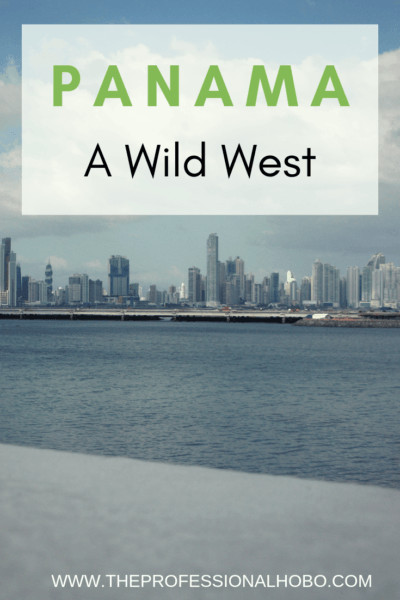
This post was originally published in 2014. It has since been updated for accuracy of links and content.
The Panama Canal
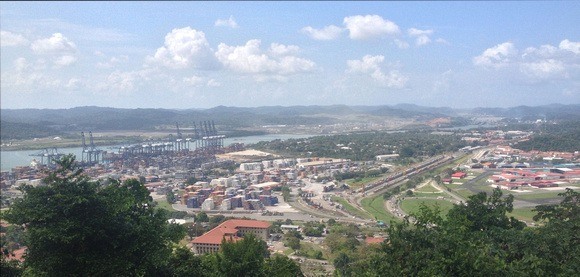
The first thing that differentiates Panama from any other country is the existence of the Panama Canal; something that has revolutionized shipping channels, and very firmly puts Panama – this narrow strip of country that connects Central and South America – on the world’s radar.
A lot of money passes through that canal every day. A lot. And Panama gets its cut (those boats don’t pass through for free).
The canal is 100% Panamanian (despite initial constructions done with the US), and it employs a huge number of people, not only to run and maintain the canal’s 24-hour operations, but also for their current massive expansion project. The lowest-paying job on the canal pays well more than the average wage of $400US/month – and it’s considered a job for life.
To what degree the money earned by the canal itself is infused into the economy is unknown to me. Panama has been a site of political instability, and corruption has existed – and probably continues to exist. (Read on about the Empty Skyscrapers to get an idea).
Developing, but Developed
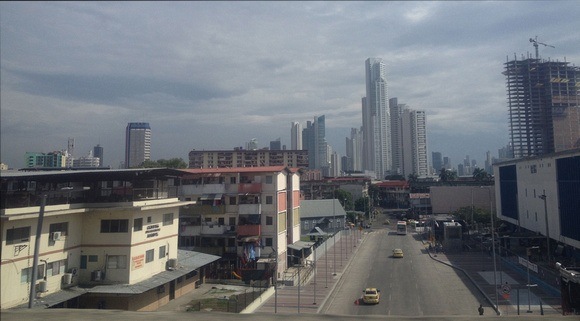
I would consider Panama a developing country, but it seems to have an edge on other developing countries. People drive nice new cars. Cars, which I learned are ridiculously taxed making them even more expensive to buy.
The Albrook Mall in Panama City is a massive shopping centre (even by North American standards), with every kind of store you can imagine, including the full complement of designer stores. It’s not the only shopping centre of this ilk, and they’re consistently packed. With Panamanians.
Even the “ramshackle” housing (outside which nice cars are often parked) is not necessarily indicative of poverty. People have disposable income, and many of them own their plots.
New construction is everywhere. Everything seems to be in various states of completion; although at times it’s hard to determine exactly what they’re doing – or rather taking so long to do. (I think it’s a tropical thing).
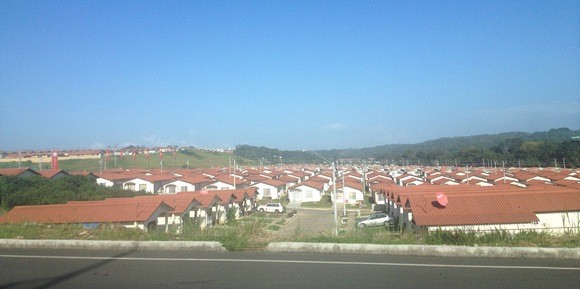
Travel along the PanAmerican Highway and you’ll see Panama’s version of suburbia, with masses of identical houses. I’m told at least some these swaths of homes are giant relocation projects, but I’m not sure of the general sentiment of the people being relocated nor what sort of “deal” they got. It might be considered an opportunity to have your own plot of land and a house if you’ve just been relocated from a dilapidated building of squatters in the city with machine-gun-toting police guarding every doorway. But somehow I doubt many relocation projects are embraced or transpire so smoothly – especially if the people being relocated already have their own home and community that developers intend to demolish.
Preparing For….?
I’ve felt a sense of fierce pride among Panamanians – despite the crumbling walls and garbage lining the roads and beaches. The pride seems to be two-fold; it’s a pride in the land and life they have, and have fought for more than once (Panama has multiple “independence days”). But in some places, it’s also a pride in knowing that they have what other people want, and will (hopefully) pay for.
I’ve been staying in Veracruz, a fishing village about 20 minutes outside of Panama City, on the Pacific side. This is a prime location for development and tourism. You know it’s coming too; infrastructure such as new street lamps now line the largely undeveloped (but well maintained) road to Veracruz.
The people who live in Veracruz know they’re on a prime spot, and it’s a gold mine – but one that might not become so without some conflict.
I was chatting with a local fellow in his early 20’s. He was proudly brandishing his latest purchase – a grenade – for $200. Looking at his foolish grin, I asked him why he bought it – was it a toy for him? (Panamanians have a penchant for fireworks every day of the week; maybe he was looking for a little more bang with this grenade).
But no – this grenade, although a source of amusement to show off, isn’t a toy. “It’s for what’s coming,” he said, while he casually referenced the hills behind town, as if a cavalry was about to come charging over it. His friends all nodded in agreement. It’s coming.
What exactly they’re preparing for, I’m not sure, as my Spanish simply wasn’t advanced enough to understand. But with grenades in hand, they’re getting ready. And this electricity hangs in the air. It’s an edgy place, and feels like the Wild West.
Empty Skyscrapers
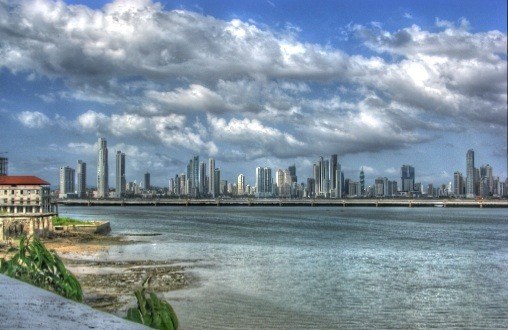
Panama City has two elements to its skyline. One is the skyline of the business centre and financial district, with a collection of high rise buildings and tightly packed infrastructure similar to most cities.
The other part is even bigger and looks fantastic – a bit like Dubai even – with soaring pristine skyscrapers, many of them condominiums. But most of these skyscrapers are empty.
This, I learned, is because Panama is one of the money-laundering capitals of the world. “Developers” build large buildings that they “rent out” to a fictitious collection of tenants who all happen to pay in cash. This cash is deposited into the “developer’s” accounts each month, and voila: the money just became legitimate.
Buildings continue to go up at a furious pace; it looks pretty but is an eerie sight – and my head spins when I think about the sheer amount of money that must go through these places. That’s a lot of dirty money.
Am I in Dubai?
Another visually Dubai-esque trait to Panama City is one of reclaimed land. In the building of the canal and current massive expansion project, the debris being dredged out has been used to reclaim land, thus connecting some some of the islands close to Panama City to the mainland.
Take a drive along the well-manicured reclaimed causeway to Amador, and you’ll see a flurry of marinas and construction in progress, restaurants, a club, residences, hotels, and more.
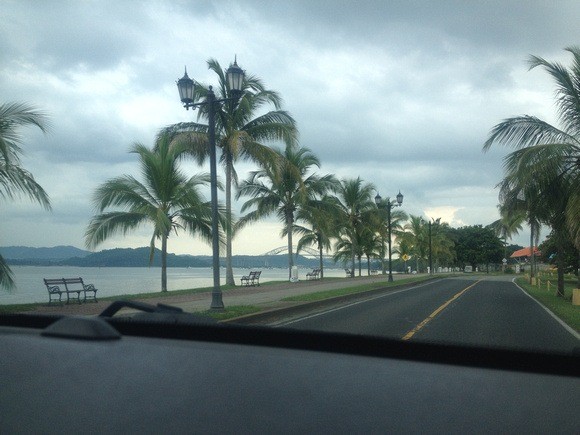
Expat Life: A Double-Edged Sword
Panama welcomes expats with open arms. There are currently many concessions offered to those who want to relocate here to buy property, start businesses, and more. It’s a hub for retirees from all over the world (but mainly from the USA) who want to stretch their retirement dollars and live somewhere warm.
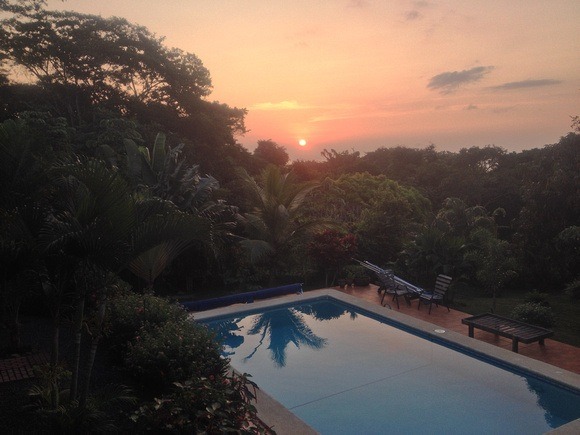
I’m house-sitting in one such expat community, tucked up just outside town, each house with a big wall and lockable gates. This is fairly typical of expat communities (and large houses in general, whether or not expat-owned) in developing countries. Minimal integration is also typical, and some expats even go so far as to express a general distaste for the local community. Comments like “Veracruz is an eyesore. We should tear it down entirely and build a big wall around it and build beachside condos and residences” are hard to hear. What of the local community – who has been there much longer than you? Why should you have all the answers, perched high on your hill and looking down on everybody else? Maybe it’s this sort of attitude that my local friend with the grenade refers to when he says “it’s coming”.
I experienced the same thing in 2011 when I first house-sat in Grenada; the property owner (a widely disliked expat who lives there half the year) did such a good job of scaring me against locals that I barely left the property in the first couple of months (heartbreak and dengue fever notwithstanding). She couldn’t hide her distaste of the place and the people if she wanted to, which made her self-interested drive to live there for the nice weather even more ugly.
As time passed and I got to know a more local side to Grenada, I observed a similar sentiment and line of demarkation between many expats and locals.
Now, having been in Grenada on and off for a couple of years, I can empathize – to a point. I’ve been ripped off, taken advantage of, and targeted by locals. It comes with the territory when there is an appearance of financial disparity. I may not be rich; but regardless, I’m seen as a source of money by virtue of the colour of my skin.
What I find refreshing about Panama (in comparison to Grenada) is the degree to which people don’t just expect handouts. If a kid wants some extra change, he eagerly bags my groceries and carries them to the car. When my partner and I go into a local bar, we’re not besieged by locals all asking (nay, expecting) us to buy them drinks (as in Grenada); no – in fact, in Panama, people buy us drinks! (Again, a sign that Panamanians have more disposable income than you might think).
Dear Panama: I’m Confused
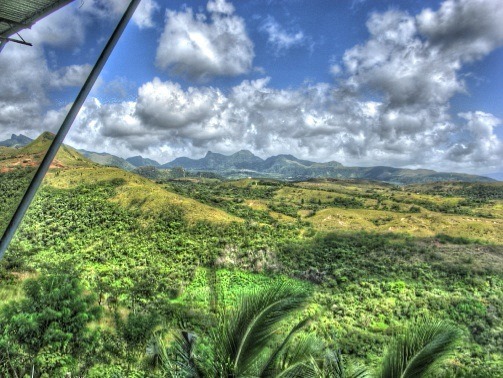
This post is probably about as dis-jointed as my impressions of Panama are. It’s a land of contrast, and a tough place to get a pulse on in under two months, especially with language barriers. What is irrefutable to me is the latin american passion and zest for life, the pride, and the fact that nobody seems to be starving. Similar to Grenada, “poverty” is open to interpretation.
Panama is also an edgy place, and one that’s ready to “go off”: both in launches of development and economic booms, and also maybe in the launch of a few grenades.
Whatever it is, they’re ready.

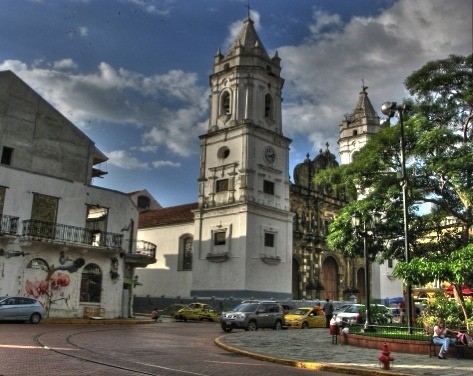

Goodness Nora, such a thoughtful and interesting piece. I must admit, I read a LOT of travel blogs and, by comparison – so many seem pretty much 90% travel “fluff”. Just so very much of the same-same, along with thinly veiled boasts of their blogging creds and their social media acumen. Please.
Whereas YOU my dear – you have long, and clearly continue to offer only the most robust advice and intelligent commentary. Seriously. Thanks!
That said, this posts is somewhat especially dear to me at the moment, as… I’ve firmly (finally!) decided that it’s bye-bye Asia and hola Latin America for me! I’m headed to settle in Ecuador soon (next month!) And while I’m over-the-MOON with the excitement of having a whole new CONTINENT to explore, not to mention vastly different culture, food, geography, etc. than here in Asia – I also suspect that in Latin America I’ll glimpse a bit of the dark side to the expat/local equation that you mention here w/ Panama and Granada.
Nonetheless, (as you so deftly polished off your post) much like the lad w/ the grenade:
I too, am ready.
Dyanne,
You go girl! So you’re trading in the g-forsaken rice paddy for a change of scenery. I don’t know to what extent you saw or interacted with expat communities in Asia, but I would surmise that it’s not much different. I can’t wait to hear about your impressions of Ecuador – a place I’m keen to visit myself.
Yup, soon it will be “on some g-forsaken mountain top in the Andes” (I’ve even already changed the curtains at TravelnLass) 😉
And yes, no doubt expat communities have some things in common the world over. And I admit that in my 2+ years here in Asia, I’ve tried my best to steer clear of the hardcore expat community enclaves. But what I haven’t seen much of here, that I did in expat enclaves in South Africa and Central America is…
…the sadly telltale iron bars and security gates on all the swank expat digs. I’m sure you know them well from Granada, those bars that so boldly demarcate the “haves and the have-nots”, yes? Not sure which came first, but such opulence amid poverty in developing nations makes for a decidedly ripe climate of dangerous “we vs. them”.
Sure, phone theft on motorbikes is pretty much a national pastime most everywhere here in Asia, but I guess I’ve not seen as much of the walled bars thing that seems the norm in Latin America.
In any case, I shall soon see for myself in Ecuador. Indeed, that’s the best part of slow traveling/expatting – learning first-hand just what makes each unique land tick.
P.S. btw, while you’re there in Panama – you ARE going to take a peek at those amazing San Blas Islands, yes?
Hey Dyanne,
Um….I’m not sure I’m going to make it to the islands. I’m leaving shortly, and this has not been a typical trip for me, for personal reasons I won’t get into. But you never know…I may well return….
As for the bars on windows – from what I’ve observed that’s not an expat thing here – everybody has bars on their windows, regardless of financial stature or how nice the dwelling is. In Veracruz, you have to look hard for a place WITHOUT bars on windows.
And it’s not just an expat thing in other countries (like Grenada) – any bigger house has these accoutrements, locally owned or not. And sad as it is, it’s also borne of necessity. Like I said I’ve been ripped off enough times in Grenada, that I’d want to protect my home too. But I refuse to have bars….a privacy wall and a gate, yes. Bars? I’d prefer not to feel like I’m in prison if I can avoid it.
Does it perpetuate the problem, or prevent problems? I’m not sure.
love this! i was thinking of going to Panama this year
You know what? I really like it here in Panama, and I would come back given the chance. It feels like I’ve barely scratched the surface. (That, and I’m enjoying practicing my Spanish, which is still horrible, but less horrible than when I arrived….)
I see not much has changed in Panama since I was there 15 years ago, except maybe the skyline. By the way, your friend with the grenade may have been referring to the drug war cartels that plague that part of Central America. I know they talked and ranted about it back when I was there at Rodman Naval Station. The only thing I did not like was the kids who would attack your car at red lights and squeegee your windows if you forgot to turn your wipers on before hand. In Panama, if a service is rendered, you are required to pay for the service, solicited, or not. If you didn’t pay, the kids would flag down the cops and they would arrest you unless payment was made. I always had my fingers next to the wiper button, just for that reason!
Dell,
Wow – that’s extreme! I haven’t seen one squeegee kid, nor was I aware of a legal obligation to pay people for services rendered – whether or not solicited.
The only thing you see at traffic lights (or in traffic in general) now, are people selling things – anything from peanuts to sunglasses to fireworks – these people stand in the middle of the road between lanes, and sell their wares to cars inching by in the traffic. Talk about hazard of the occupation….. Eek!
Hi Nora,
Great read! We spoke to a US expat living in Panama for some 40 years, in Costa Rica. He loved it. Developing nation with a cash cow in the canal.
Thanks for sharing!
Hey Ryan,
Developing nation with a cash cow in the canal: there’s a good summation!
I’m glad you enjoyed this post. It only took two months of living here to (finally) come up with it… 😉
I think it’s impossible not to have conflicting feelings about Panama City, where it’s headed, and the expats there. It’s a strange place in a lot of ways. But overall, it’s working, Panama having the highest growth rate in the Americas the past couple years.
From a real estate article I wrote a while back, it’s not just dirty money resulting in those empty skyscrapers. There’s a lot of legit money too from investors who buy condos and only use them a week or two a year. Especially Venezuelans and Argentines who don’t trust their own institutions enough to park their money at home. Panama is seen as safe and secure, with a dollar economy and low inflation.
Hi Tim,
Thanks for the insight! I knew you’d have a good inside scoop on the pulse of latin America, given your extensive travels and time here.
One thing that really amazed me was the cost of living and buying things – which is just about the same as in North America. You’ll save money on food at local markets and such, but that’s about it. Condos aren’t cheap, (rent can be cheap but not always), cars aren’t cheap, and the accoutrements of life are the same – if not more expensive. How do people survive, if the average wage is $400US/month? I guess it’s all about strength in numbers, with large families all living together and pooling their income.
Thoughts?
the average wage is not 400. thats the minimum wage ;D and i think the idea that we panamanians live all the family in one house is wrong xD
Im sorry for my english
Hi Yuri,
The idea that $400/month is the minimum not the average makes a little more sense. Most of the locals I met lived together as a family, but maybe it’s different depending on the area. Are you Panamanian?
Wow, this is an amazing comprehensive review of the place. What probably surprises me the most – though it shouldnt – is the distasteful attitudes of the expats towards the locals and the place. I see it in Moscow too – lots of westerner professionals come here to make money (banking, consulting, oil&gas – most pay the same or more than in the US/UK but are taxed at 13%, plus there’s less hours, more vaca etc), and all they do is complain about this place. I’m not talking about the winters (we all complain about those), but politics and corruption (which, while true, is what most of them profit from directly), unfriendly locals, bad customer service, dirty roads, crowded markets, etc etc etc. So tiring. And they tend to not leave their pricey expat bubbles. So sad. Didnt expect to hear this about a tropical paradise though – I expect warm weather and evergreens to make everything better and everyone friendly and mellow 🙂
Hi Anna,
Sadly, I think the expat observation is a common one, regardless of weather or economic conditions.
Having grown up in Toronto (one of the most multi-cultural cities in the world), almost everybody was from somewhere else. And similar things happened there – expats were often insular, keeping company solely with people from their own community/country (sometimes not even bothering to learn English), and some complained about discrepancies between Toronto and their homeland.
As a “local” in Toronto, it was hard to take. “Well if your home country is so great, go back!” was my feeling (but rarely voiced out loud).
To some extent I think it’s just a human condition. So I try to cut everybody some slack….but it’s not always easy.
I get the complaining bit, we all do it, I do it (I hated the NY subway for example, for a gazillion reasons). But what bugs me is a very specific kind of complaining by a very specific kind of expat (or just outsider): usually it’s the folks that relocated out of want and not need (ie, moving somewhere bc it’s the only place where they could get a decent job, or moving to be with a partner, so it’s less of a discretionary decision). Then, they complain about problems that, are either ridiculous (my biggest pet peeve in Moscow – no Bud Light. #firstworldproblems) or while quite possibly ARE real (garbage, corruption, inequality) do not actually affect them and their sheltered, gated-community lifestyle. Also, often instead of looking at a specific problem, they just make blanket condescending judgments about entire peoples, communities, places and countries. And they never take into account the perspectives of the local population, whom they expect to be one mass service class catering to the expat’s every colonial whim. [exhales]
Hi Anna,
Yet another human condition: to paint with a broad brush based on a narrow view or exposure. We always seem to need to compartmentalize experiences and draw vast conclusions from them in order to understand a place for ourselves. To an extent, I’ve even done the same with this post…nobody is immune! 🙂
Hey, I’ve recently heard about house-sitting, and am interested in learning more. Have you done an article detailing the aspects of house-sitting? I live in China, but am open to doing it anywhere in the world, especially if it means having the opportunity to stay long-term and explore the culture much more in-depth!
Hi Sean,
Oh yes – I’ve written extensively about house-sitting! You can start here:
https://www.theprofessionalhobo.com/the-creative-guide-to-free-or-cheap-accommodation/
And if you’re interested in learning more about house-sitting as well as other forms of free accommodation, check out my book:
https://www.theprofessionalhobo.com/travel-tips-resources/get-free-accommodation-around-world/
Hi Nora,
Nice article. We had an opportunity to tour Panama recently too. We only dedicated 3 days to Panama City because we know we would not want to settle there, for some of the reasons you describe.
However, we found expats in Panama (outside of the immediate Panama City) to be the most friendly we’ve found anywhere else. In Boquete for example, 1/3 of the population are expats. They have integrated beautifully into Panamanian life. They are warm and friendly and helpful. We did not see any of the animosity you describe. The same goes for the Bocas and David. So, I think some of it depends on where you are in Panama.
We overall, loved the country. We visit Latin America a lot, we love the culture. And I gotta say I think Panama is at the top of our favorites list.
Joanna-
Hi Joanna,
I don’t have much of a frame of reference with regards to Latin America since Panama is my first (believe it or not, after 7 years of traveling!), but as I wrap up my time here, I can’t help but feel that I have “unfinished business”. I hope to return!
Great insight on the REAL Panama. I was there several years ago, but just for a day. With the cost of living in the US being so high, Panama is one of the countries on our “list” to possible relocate too.
Hi Carey,
You know, I didn’t find Panama very inexpensive. US currency is used there (it is tied to the Panamanian Balboa), and groceries and supplies are all pretty close to US prices. Real estate is no longer the steal it was 10 years ago either.
But, there’s no denying – even as Florida emerges from its deep freeze: the weather in Panama is most definitely better!
Carey. The “real” Panama is in the city proper. It’s gritty, honest, kind and one day or seven weeks is not nearly enough time to absorb.
Hello Nora! We last spoke when we were in Switzerland! Glad you are doing well. I just read your piece on Panama. I am here now and can totally relate to what you are saying! What an interesting and trippy country! We are here for a month and looking forward to our continued experiences!
Hi Lori,
I can’t tell you how pleased I feel that you relate to my views/experiences in Panama! It makes me feel like I’m not totally out in left field. 😉 Enjoy Panama! (Where to next?)
We were in Panama last summer and saw much of what you experienced there. I definitely remember seeing the suburbia which is growing in blobs around the city!
Check out my “3 Scariest Things About Panama” blog post, if you wish!
http://www.borntobeatourist.co.uk/2013/07/the-top-3-scary-things-about-panama.html
Keep blogging, I love it!
Lou x
http://www.borntobeatourist.co.uk
@misswriteuk
Find me on Facebook
Hi Louise,
Wow – that fog is epic! I’d be quite the nervous passenger as well. Thankfully I didn’t have any encounters with crooked cops, but I’m fully aware that in more countries than not, cops are not always “the good guys”. Glad these bad experiences didn’t taint Panama for you…it’s a very interesting country indeed!
Hi Nora, I did my first house/pet sitting gig May 2014 in Ojochal Costa Rica. Now feel ready to try it again but not sure where to go and air fare is defining factor (I pay rent where I live on Vancouver Island BC). Thinking a different part of Costa Rica, Belize, or Hawaii. With greater distance comes a greater air fare cost – any tips? Maureen
Hi Maureen,
Yes, airfare can be a challenge. I have to techniques to keep my cost of flying down: one is the use of frequent flyer miles, and you can find a good summary of how to manage them here: https://www.theprofessionalhobo.com/financial-travel-tip-84-being-a-first-class-flyer/
The other technique I use – which could be useful for flights out of Vancouver – is mystery shopping, which gives you (at least) 50% off airfare:
https://www.theprofessionalhobo.com/financial-travel-tip-112-50-airfare-mystery-shopping/
Happy travels!
Another way to find cheap distance travel is one-way or repositioning cruises. Last minute (within 2 months) can also be a great deal, depending on how desperate they are to fill the cabins. Usually, you are still eligible for whatever incentive package they have going at the time.
Inside rooms are cheapest and sometimes the rates are so low, that it’s still a great deal to pay the double rate yourself if you cannot find a cabinmate.
Remember that this is not just travel like air would be, but meals (oh, the food!) entertainment, and lodging for the length of the trip, too, so figure that in when comparing. I often find them for under $50/day. Considering this includes EVERYTHING (except taxes & tips) it’s worth it to me! Register with all the cruise lines you would consider using so you get notice of the private sales and early warning on price drops.
My master plan is to go wherever I can get either a house-sit gig or an under $50/day 1-way cruise, then stay until another one comes up in any direction. Spain to Florida in 13 days this Nov? $614. Italy to Dominican Republic in 19 days this Dec? From $868. Italy to Florida in 26 days in Dec, with 13 stops, including Morocco and all around the Caribbean starting at $1297. If you’re ready to leave this May, you can go Panama to Portugal in 13 days for $195 & up! $15/day!
I’m still anchored to Phoenix, but making progress to be a full-time traveler by end of the year. Had some health & family issues that slowed me way down, but most are resolved now & I can gear up my efforts. In the meantime, I’m researching my heart out. I am SOOO ready! Just gotta get rid of all the ‘stuff’ and my house.
Hi Sandy,
Great advice about repositioning cruises! I haven’t done one yet, but you’ve just inspired me to do some research. Do you have a favourite website that you use to find these deals?
Reading this at the end of 2022 and everything still makes sense. I’ve learnt a lot about Panama from your post. We are currently in Panama City for vacation and we love it. It’s quite interesting country that’s why I decided to learn about it more
Hi Kasi,
Wow – interesting that it still has that Wild West feeling all these years later! Glad you are enjoying yourselves 🙂